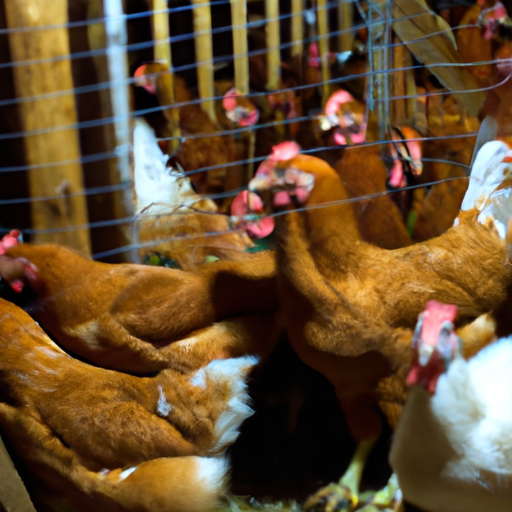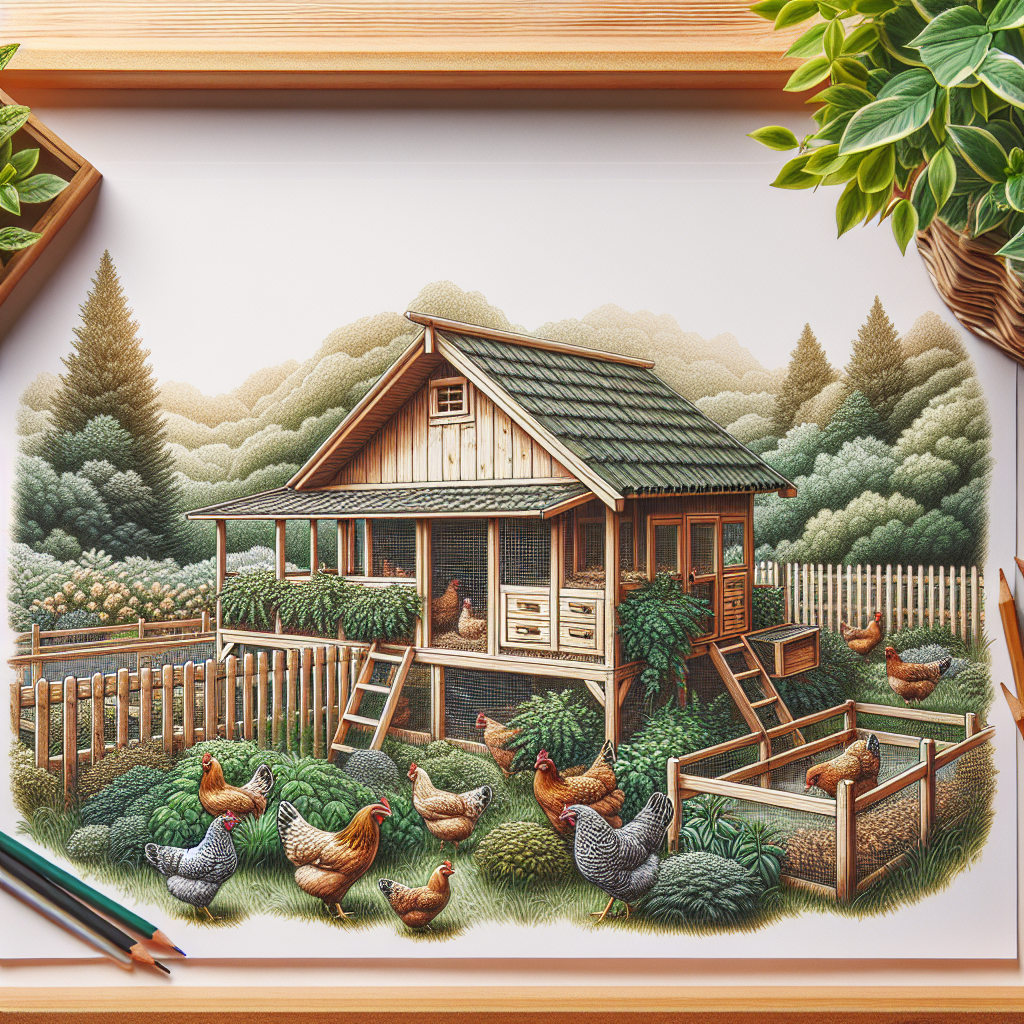Are you a poultry owner concerned about the health and well-being of your flock? In this article, we will explore various biosecurity measures that you can easily implement to prevent the spread of diseases among your feathered friends. By following these simple guidelines, you can minimize the risk of illness, maintain a healthy environment, and ensure the longevity and productivity of your flock. So, let’s get started on protecting your beloved birds!
Quarantine procedures
Separate new birds from existing flock
When introducing new birds to your flock, it is essential to separate them from the existing birds for a period of time. This helps prevent the potential spread of diseases that the new birds may be carrying. Quarantine should ideally last for about 30 days, during which you can observe the health and behavior of the new birds closely. This also allows for early detection of any potential illnesses or infections.
Isolate sick or injured birds
If you notice any signs of illness or injury in any of your birds, it is crucial to isolate them immediately to prevent the spread of disease to other healthy individuals in the flock. Create a separate space for the sick or injured bird, ensuring it is comfortable and has access to food and water. By isolating them, you provide an opportunity for appropriate treatment and minimize the risk of sickness spreading throughout the flock.
Implement a strict introduction protocol
When introducing new birds to your flock, it is important to have a strict introduction protocol in place. This includes thoroughly cleaning and disinfecting any equipment or tools used during the process. It is also advisable to introduce new birds at night, as this reduces the chance of aggression and territorial disputes between the new and existing flock members. By implementing a strict introduction protocol, you minimize the risk of introducing diseases to your established flock.
Hygiene practices
Maintain cleanliness in the coop and surrounding areas
Regularly cleaning and maintaining cleanliness in the coop and the surrounding areas is crucial for preventing the spread of diseases in your flock. Remove any manure, bedding, or feed that may have accumulated. Sweep or hose down the area to remove dirt and debris. By practicing good hygiene, you create a healthier environment for your birds, reducing the risk of disease transmission.
Practice proper hand hygiene
Ensure you practice proper hand hygiene when interacting with your flock. Wash your hands before and after handling the birds, as well as after cleaning the coop or handling any equipment. Use soap and warm water, scrubbing your hands thoroughly for at least 20 seconds. Proper hand hygiene is a simple yet effective way to prevent the spread of diseases from your hands to the birds or vice versa.
Clean and disinfect equipment and tools
Regularly clean and disinfect any equipment or tools that come into contact with your flock. This includes feeders, waterers, and any handling equipment. Use a disinfectant approved for use in poultry farming and follow the manufacturer’s instructions for proper use. By cleaning and disinfecting, you reduce the risk of disease-causing organisms persisting on equipment, decreasing the likelihood of contamination.
Vaccinations
Consult with a veterinarian for appropriate vaccines
Consulting with a veterinarian who specializes in poultry health is essential to determine the appropriate vaccines for your flock. They can assess the specific risks and recommend vaccines based on the prevalent diseases in your area. A veterinarian can provide guidance on the timing and administration of the vaccines to ensure maximum effectiveness.
Follow recommended vaccination schedules
Once you have identified the appropriate vaccines for your flock, it is crucial to adhere to the recommended vaccination schedules. Vaccinations should be given at the correct age or stage of development for maximum effectiveness. Be diligent in tracking and recording the vaccinations administered to ensure accurate monitoring and appropriate follow-up.
Keep records of vaccinations administered
Maintain accurate records of all vaccinations administered to your flock. These records should include the type of vaccine, the date it was administered, and the identification or tag numbers of the birds vaccinated. Keeping detailed records allows for easy tracking of the flock’s vaccination history and aids in identifying any potential gaps in vaccination coverage.
Monitoring and early detection
Regularly observe flock behavior and appearance
Regularly observing your flock’s behavior and appearance is essential for early detection of any signs of illness or distress. Changes in behavior, such as reduced activity, decreased feed consumption, or abnormal behavior, may indicate potential health issues. Similarly, changes in appearance, such as ruffled feathers, weight loss, or abnormal droppings, could be signs of underlying problems. By paying close attention to your flock, you can address any issues promptly, minimizing the spread of diseases.
Be vigilant for signs of illness or distress
Be vigilant and proactive in looking out for signs of illness or distress in your flock. This includes monitoring for symptoms like coughing, sneezing, wheezing, diarrhea, or swollen joints. Additionally, keep an eye out for birds that isolate themselves from the group or exhibit abnormal posture or movement. Promptly isolate and seek appropriate veterinary care for any birds showing signs of illness or distress to prevent any potential spread of diseases.
Implement routine health checks
Establishing a routine for regular health checks can help you monitor the overall health of your flock. These checks can include assessing body condition, checking for external parasites, and examining the condition of the feathers, eyes, and beak. By implementing routine health checks, you increase the chances of early disease detection and subsequent intervention, promoting the wellbeing of your flock.
Pest control
Implement measures to control rodents and wild birds
Rodents and wild birds can introduce diseases to your flock, making it crucial to implement measures to control them. Keep feed securely stored in rodent-proof containers, eliminating potential attractants for pests. Seal any holes or gaps in and around the coop to prevent entry by rodents or wild birds. By practicing effective pest control, you minimize the risk of disease transmission to your flock.
Regularly inspect and clean coop for signs of pests
Regularly inspecting and cleaning the coop helps identify any signs of pests. Look for droppings, nesting materials, or damage to feed containers that may indicate the presence of rodents or wild birds. If any signs are observed, take immediate action to remove the pests and clean the coop thoroughly. Regular inspection and cleaning contribute to maintaining a healthy and disease-free environment for your flock.
Use appropriate pest control methods
When implementing pest control measures, use appropriate methods that are safe for the environment and for your birds. Avoid using harmful chemicals that may pose health risks. Instead, consider non-toxic alternatives such as traps, exclusion methods, or natural deterrents. Always prioritize the wellbeing of your flock when selecting and applying pest control methods.
Biosecurity education
Educate yourself about common poultry diseases
Take the time to educate yourself about common poultry diseases. Understand the signs, symptoms, and transmission methods of these diseases. This knowledge allows you to recognize potential threats and take appropriate preventive measures. Resources such as reputable books, online publications, or veterinary guidance can provide valuable information in enhancing your understanding of poultry diseases.
Attend workshops or seminars on biosecurity
Attending workshops or seminars on biosecurity can further enhance your knowledge and understanding of disease prevention in poultry. These events often provide up-to-date information on industry best practices and the latest research findings. Networking with other poultry owners and industry professionals during these events helps broaden your knowledge and facilitates the exchange of ideas and experiences.
Share knowledge with fellow poultry owners
As a responsible poultry owner, it is important to share your knowledge and experiences with fellow owners. This can be through casual discussions, social media groups, or participating in community events. By sharing your knowledge, you contribute to a collective effort in preventing the spread of diseases and improving overall biosecurity measures within the poultry community.
Record keeping
Maintain accurate records of flock management activities
Maintaining accurate records of flock management activities is crucial for effective disease prevention and management. Keep detailed records of feed and water consumption, temperature fluctuations, housing modifications, and any changes to vaccination or treatment schedules. This information serves as a valuable reference for identifying potential disease patterns or pinpointing areas that may require improvement.
Track health histories and treatments administered
Record and track the health histories of individual birds within your flock. Note any illnesses, injuries, or treatments administered, including medications and dosages. This helps in monitoring the overall health of your flock and provides important information for diagnosing and treating any future ailments.
Keep track of any disease outbreaks
If your flock experiences a disease outbreak, keep meticulous records of the details. Note the date the outbreak occurred, the symptoms observed, and the actions taken to control the spread of the disease. This information is essential for identifying the source of the outbreak, determining preventive measures for the future, and assisting veterinary authorities in their disease surveillance efforts.
Minimizing flock exposure
Limit contact with other flocks and birds
Minimizing contact with other flocks and birds is an effective way to reduce the risk of disease transmission. Avoid allowing your birds to come into direct contact with birds from other flocks, whether through shared spaces or shared equipment. Restricting contact helps prevent the introduction of diseases into your flock.
Control visitor access to the poultry area
Implement measures to control visitor access to the poultry area. Restricting access to only necessary personnel can significantly decrease the risk of diseases being inadvertently brought in. Additionally, ensure that visitors follow proper hygiene protocols, such as handwashing and disinfection of footwear, to minimize the potential spread of diseases.
Avoid sharing equipment or tools with other poultry owners
Avoid sharing equipment or tools with other poultry owners to minimize the risk of disease transmission. If equipment must be shared, ensure it is thoroughly cleaned and disinfected before and after use. By avoiding the sharing of equipment, you reduce the chances of introducing diseases into your flock through contaminated tools.
Proper waste disposal
Dispose of manure and waste properly
Proper disposal of manure and waste is crucial for maintaining good biosecurity practices. Manure should be removed from the coop and surrounding areas regularly using appropriate equipment. Dispose of the manure in a manner that complies with local regulations and guidelines. Proper waste disposal reduces the presence of disease-causing pathogens, minimizing the risk of infection within the flock.
Prevent direct contact between manure and chickens
Prevent direct contact between chickens and manure to minimize the risk of disease transmission. Elevated perches or platforms can help keep the birds away from the manure. Additionally, regularly clean and disinfect the coop floor to further reduce the possibility of direct contact with manure.
Implement effective waste management systems
Implementing effective waste management systems can significantly contribute to disease prevention. This can include composting manure to convert it into a safe and nutrient-rich soil amendment. Alternatively, arranging for professional waste removal services can ensure proper disposal of all waste materials. Effective waste management reduces the potential for disease transmission in the flock environment.
Tracking and reporting
Report any suspicious or unusual disease symptoms
If you observe any suspicious or unusual disease symptoms in your flock, promptly report them to appropriate authorities, such as local veterinary services or extension offices. This allows for timely intervention and monitoring of potential disease outbreaks. Reporting also contributes to overall disease surveillance efforts, enhancing the awareness and prevention of diseases in the poultry community.
Cooperate with local authorities and veterinary services
Cooperating with local authorities and veterinary services is vital in disease prevention and control. Follow their guidance and recommendations for biosecurity measures, vaccinations, and disease management. Be proactive in seeking their assistance and expertise in detecting and addressing any potential disease threats to your flock.
Participate in disease surveillance programs
Participating in disease surveillance programs helps monitor the prevalence and spread of diseases in the poultry population. These programs typically involve regular testing and reporting of flock health status. The data collected through these programs enables veterinary authorities to track disease trends and implement targeted interventions. By actively participating, you contribute to the welfare and biosecurity of the broader poultry community.
By implementing these comprehensive biosecurity measures, you can significantly reduce the risk of diseases spreading within your flock. Remember, maintaining a clean and healthy environment, practicing good hygiene, and staying vigilant are key to promoting the overall well-being of your birds. Stay informed, seek professional advice when needed, and collaborate with fellow poultry owners and authorities to ensure the highest level of biosecurity for your flock.




